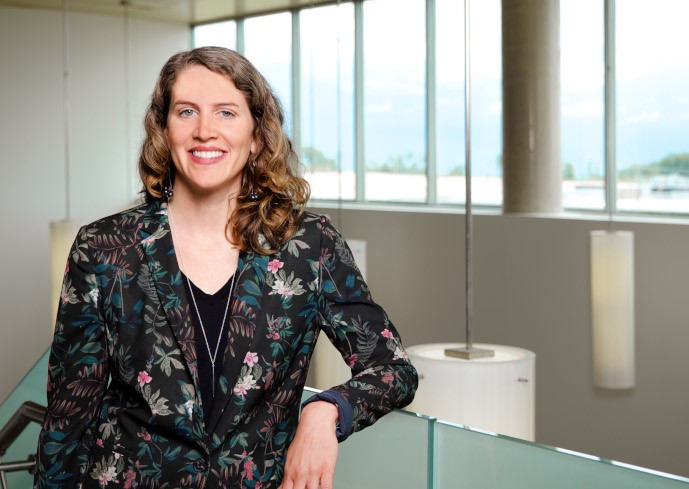Professor Ellen Field hopes Canada's education ministries will respond to the climate crisis and to young people's climate anxiety by introducing policies on climate change education.
Dr. Field, who teaches at Lakehead Orillia, was glad that British Columbia's Ministry of Education released a policy statement on climate change in December 2021, the first (and only) ministry to do so.
"While there is room for improvement to that Ministry's climate change content, the new curriculum has mandatory climate change expectations and if a teacher feels confident in their understanding of climate change, they can link many big ideas to climate change topics," Dr. Field says.
"Other provinces are much further behind in terms of curriculum policy."

Dr. Field is passionate about climate change education because education systems have been slow to address the urgency.
"We have a window, and we don't need incremental change but radical change on a short timeline – that is why I do the work I do."
Thanks to a grant from the Social Sciences and Humanities Research Council of Canada, Dr. Field is studying creative and diverse ways that educators teach climate change across Canada and how school boards and ministries are implementing climate change policy.
This research will provide further context by monitoring the policies of jurisdictional climate change education across Canada.
We have currently experienced just over one degree of warming globally, what might three degrees of warming look like?
Dr. Field is hoping that a manuscript of her research – which evaluates expectations of climate change education in provincial curricula – will soon be published to shed new light on how each province is doing when teaching climate change.
Her aim is to inform curriculum policymakers and researchers to help improve the quality and quantity of climate change education across Canada.
"The issue is that climate change expectations have been integrated in some places based on the knowledge of those involved in the curriculum review and there has not been a comprehensive or consistent framework of climate change education applied to the curriculum."
That is why Dr. Field hopes Canada's education ministries will take stronger leadership on climate change and include Indigenous and traditional knowledge keepers and youth to help determine what the curricula will look like.
"We have until 2030 to reduce our greenhouse gases by 50 per cent, otherwise we risk crossing tipping points which stabilize the climate," she says.
"We most likely have already passed three of these tipping points – Arctic summer sea ice loss, coral reef collapse, and the melting of the West Antarctic ice sheet, however, nine other systems are showing increasing signs of destabilizing."
How bad the Earth will become depends on how much hotter humans allow the planet to get.
"We have currently experienced just over one degree of warming globally, what might three degrees of warming look like?"
Dr. Field does not want to learn the answer to that question. Through her research, she has realized that some Ontario school boards are making great strides while others are not.
"Several school boards in Ontario have declared climate emergencies, such as the Halton District School Board and the Rainbow District School Board," she says.
"Trillium Lakelands is implementing a student-led climate action plan comprised of 10 phases including student mental health, youth advocacy, and carbon conscious transportation."
Dr. Field says students can play a role by pushing for the education that they now desperately need.
"Students can request more climate change education," she says. "They can get involved in extracurricular environmental groups by joining Fridays for Future chapters or other climate-focused groups in their communities."
Some municipalities have youth councils that directly involve young people in decision-making. For example, Climate Education Reform BC has been petitioning the Ministry of Education to improve content for climate change education through their reform to transform campaign.
"Young people should feel empowered to speak about this existential crisis and what the risk of inaction will mean in terms of their future quality of life," Dr. Field said.
Introducing climate change discussions to the classroom
"Science is traditionally where climate change education has been integrated and the most teaching resources are available in this area."
"Mathematics lends itself to studying probability, or even data management. For example, I've had students explore publicly available CO2 emission data from the Mauna Loa research station in Hawaii to look for trends and patterns."
"Civics is a really interesting space since youth plaintiffs have become increasingly successful at making the case of the intergenerational inequity at play if greenhouse gas emissions aren't radically reduced by 2030. In fact, we collectively have youth climate activists to thank for ushering in some of the strongest climate policies we have. Discussions in civics class about the role of the courts in these decisions, as well as the fiduciary duty of corporations to limit warming to 1.5 degrees (as in the case affecting Shell), and concepts of activism and citizenship in the age of climate change are important."
"Art is so incredibly important to allow students to process the psychological fallout or emotional toll of realizing that the systems governing our societies for the last 30 years have not safeguarded the well-being of people or the planet. Art is also a great venue for imagining hopeful futures. I am thinking of artists who put forward artistic visions of better futures like the work of graffiti artist Bruno Smoky, Kim Stanley Robinson's recent book the Ministry of the Future, or many of the solar punk authors who engage in putting forward hopeful futures that are grounded in possibility, not just disconnected optimism."


